|
|
|
Sort Order |
|
|
|
Items / Page
|
|
|
|
|
|
|
| Srl | Item |
| 1 |
ID:
151647
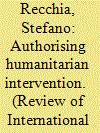

|
|
|
|
|
| Summary/Abstract |
Even scholars who support multilateralism in principle frequently question the value of securing approval from existing multilateral bodies for humanitarian intervention. The United Nations (UN) and regional organisations such as NATO, the argument goes, are far from democratic; furthermore, multilateralism is often a recipe for doing nothing; therefore, unauthorised intervention should be permissible in circumstances of ‘humanitarian necessity’. This article maintains that although today’s multilateral organisations and related procedures for authorising armed intervention may be suboptimal, they have significant output legitimacy. First, existing authorisation procedures reduce the risk of destabilising conflict spirals among powerful states. Second, they diminish the likelihood that humanitarianism will be used as a pretext. Third, they reduce epistemic problems concerning the identification of a just cause for intervention and thus the risk of accidental abuse. Fourth, they minimise the ‘moral hazard’ of humanitarian intervention. Finally, compliance with multilateral procedures is increasingly required for successful peacebuilding. This leads me to conclude that humanitarian warfare should always be authorised by the UN or regional multilateral organisations.
|
|
|
|
|
|
|
|
|
|
|
|
|
|
|
|
| 2 |
ID:
143150
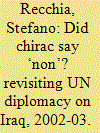

|
|
|
|
|
| Summary/Abstract |
THE STANDOFF BETWEEN THE UNITED STATES and France leading up to the 2003 Iraq War probably “led to the most serious deterioration of transatlantic relations in recent memory.”1 According to a prominent view first advanced by American and British officials and subsequently taken up by academic analysts, President George W. Bush and Prime Minister Tony Blair made an all-out effort to secure United Nations (UN) approval before invading Iraq, but French president Jacques Chirac's public veto threat on 10 March 2003 doomed that effort to failure.2 Put differently, France's determination to use the UN Security Council (henceforth SC or UNSC) as an instrument for “soft balancing” American power made UN approval unattainable.3
|
|
|
|
|
|
|
|
|
|
|
|
|
|
|
|
| 3 |
ID:
171706
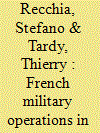

|
|
|
|
|
| Summary/Abstract |
After the end of the Cold War, Paris’s traditional, paternalistic interference in Francophone Africa became increasingly questioned. Partly in response to that, over the last two-and-a-half decades, France’s Africa policy has emphasised multilateral cooperation and local capacity building through the United Nations, the European Union, and various ad hoc multilateral frameworks. This special issue aims to unpack and assess France’s efforts to (a) re-legitimise its military presence on the African continent by securing political endorsements from multilateral bodies; (b) share burdens and liabilities through greater reliance on collective implementation; and (c) re-affirm its own status as a leading power by often spearheading collective military missions.
|
|
|
|
|
|
|
|
|
|
|
|
|
|
|
|
| 4 |
ID:
171708


|
|
|
|
|
| Summary/Abstract |
Scholars argue that the 1991 Gulf War, when the United States worked hard to secure approval from the United Nations (UN), set a precedent for legitimate military intervention that other states, especially other liberal democracies, subsequently felt compelled to follow. France, however, continued to intervene unilaterally in its traditional African sphere of influence for several years, without seeking approval from the UN or regional bodies. Even after France drew widespread opprobrium for its support of a murderous regime in Rwanda, French leaders deployed thousands of combat troops unilaterally on various missions. This article relies on original interviews with French policymakers as well as on primary documents to make the case that the 2002–04 Côte d’Ivoire intervention finally steered French Africa policy towards greater multilateralism. It drove home the danger that unilateral interventions could fuel anti-French sentiment among African audiences, undermining France’s regional influence. Ultimately, therefore, concerns about African acceptance more than broader international pressure led France to fully embrace new norms of legitimate intervention.
|
|
|
|
|
|
|
|
|
|
|
|
|
|
|
|
| 5 |
ID:
171207


|
|
|
|
|
| Summary/Abstract |
The conventional wisdom about the 1992 US intervention in Somalia is that it was a quintessentially humanitarian mission pushed by President George H. W. Bush. This article challenges that interpretation, drawing on newly declassified documents. The Somalia intervention, I argue, was largely a pragmatic response to concerns held by the US military. In late 1992, as the small UN mission in Somalia was collapsing, senior American generals worried about being drawn into the resulting vacuum. Hence they reluctantly recommended a robust US intervention, in the expectation that this would allow the UN to assemble a larger peacekeeping force that would take over within months. The intervention ultimately failed, but the military learned useful lessons from this experience on how to achieve smoother UN handoffs in the future and thus effectively shift longer-term stabilisation burdens to the international community.
|
|
|
|
|
|
|
|
|
|
|
|
|
|
|
|
| 6 |
ID:
140401
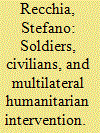

|
|
|
|
|
| Summary/Abstract |
Approval from the United Nations or NATO appears to have become a necessary condition for US humanitarian military intervention. Conventional explanations emphasizing the pull of legitimacy cannot fully account for this given that US policymakers vary considerably in their attachment to multilateralism. This article argues that America's military leaders, who are consistently skeptical about humanitarian intervention and tend to emphasize its costs, play a central role in making multilateral approval necessary. As long as top-ranking generals express strong reservations about intervention and no clear threat to US national security exists, they can veto the use of force. In such circumstances, even heavyweight “humanitarian hawks” among the civilian leadership, who initially may have wanted to bypass multilateral bodies to maximize US freedom of action, can be expected to recognize the need for UN or NATO approval—if only as a means of mollifying the generals by reassuring them about the prospect of sustained multilateral burden sharing. Two case studies drawing on interviews with senior civilian and military officials illustrate and probe the plausibility of the argument.
|
|
|
|
|
|
|
|
|
|
|
|
|
|
|
|
| 7 |
ID:
144079
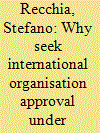

|
|
|
|
|
| Summary/Abstract |
What motivates the United States, the world’s most powerful country, to seek multilateral approval from the United Nations or NATO for its military interventions? Drawing on interviews with top-level US policymakers and combining process tracing with a structured-focused comparison of several cases, this article reveals that American leaders do not value multilateral approval primarily to avert negative issue linkage, or ‘soft balancing’ in other policy domains. Instead, they are motivated by narrower concerns. Their main goal is to facilitate sustained military and financial burden sharing on the prospective intervention, in the expectation that this will assuage congressional concerns about resource costs, reducing the risk that Congress might withdraw its support once American troops are deployed. The article therefore demonstrates that (1) US policymakers worry less about issue linkage than many International Relations theorists, as policymakers are confident that overall, US power inclines other countries to bandwagon with the United States, and (2) contrary to widespread belief, executive-branch concerns about congressional opposition do significantly influence US military intervention decision-making.
|
|
|
|
|
|
|
|
|
|
|
|
|
|
|
|
|
|
|
|
|